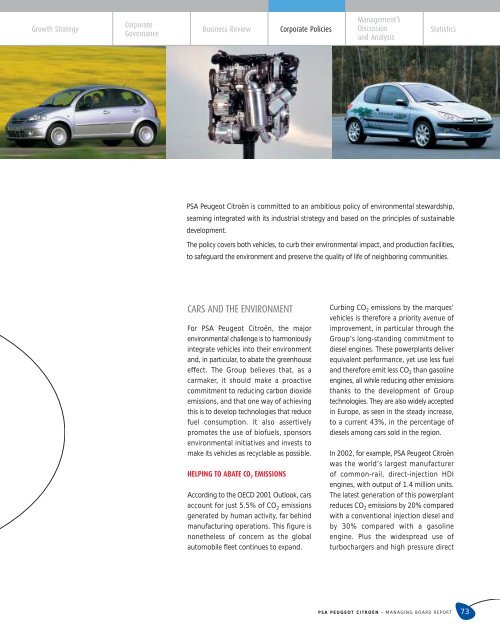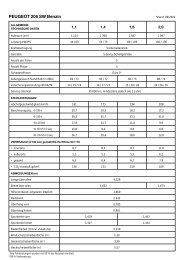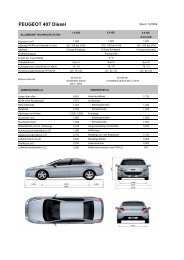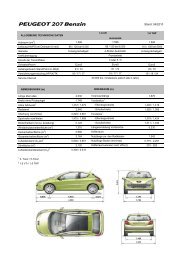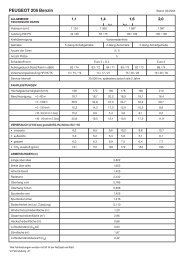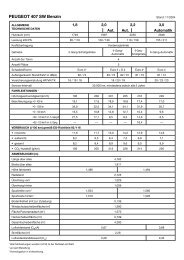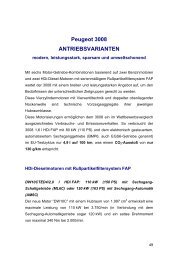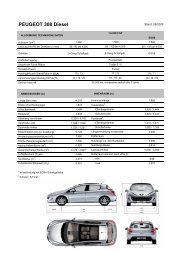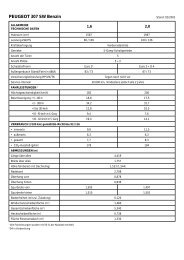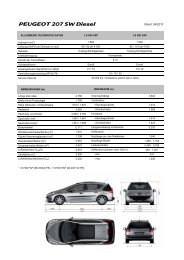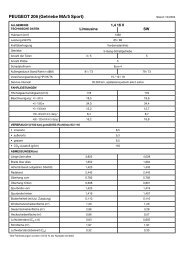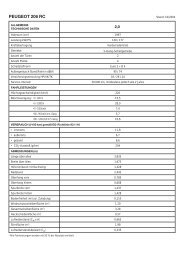PSA COUV page . page RA GB - PEUGEOT Presse
PSA COUV page . page RA GB - PEUGEOT Presse
PSA COUV page . page RA GB - PEUGEOT Presse
You also want an ePaper? Increase the reach of your titles
YUMPU automatically turns print PDFs into web optimized ePapers that Google loves.
Growth Strategy<br />
Corporate<br />
Governance<br />
Business Review<br />
Corporate Policies<br />
Management’s<br />
Discussion<br />
and Analysis<br />
Statistics<br />
<strong>PSA</strong> Peugeot Citroën is committed to an ambitious policy of environmental stewardship,<br />
seaming integrated with its industrial strategy and based on the principles of sustainable<br />
development.<br />
The policy covers both vehicles, to curb their environmental impact, and production facilities,<br />
to safeguard the environment and preserve the quality of life of neighboring communities.<br />
CARS AND THE ENVIRONMENT<br />
For <strong>PSA</strong> Peugeot Citroën, the major<br />
environmental challenge is to harmoniously<br />
integrate vehicles into their environment<br />
and, in particular, to abate the greenhouse<br />
effect. The Group believes that, as a<br />
carmaker, it should make a proactive<br />
commitment to reducing carbon dioxide<br />
emissions, and that one way of achieving<br />
this is to develop technologies that reduce<br />
fuel consumption. It also assertively<br />
promotes the use of biofuels, sponsors<br />
environmental initiatives and invests to<br />
make its vehicles as recyclable as possible.<br />
HELPING TO ABATE CO 2 EMISSIONS<br />
According to the OECD 2001 Outlook, cars<br />
account for just 5.5% of CO 2 emissions<br />
generated by human activity, far behind<br />
manufacturing operations. This figure is<br />
nonetheless of concern as the global<br />
automobile fleet continues to expand.<br />
Curbing CO 2 emissions by the marques’<br />
vehicles is therefore a priority avenue of<br />
improvement, in particular through the<br />
Group’s long-standing commitment to<br />
diesel engines. These powerplants deliver<br />
equivalent performance, yet use less fuel<br />
and therefore emit less CO 2 than gasoline<br />
engines, all while reducing other emissions<br />
thanks to the development of Group<br />
technologies. They are also widely accepted<br />
in Europe, as seen in the steady increase,<br />
to a current 43%, in the percentage of<br />
diesels among cars sold in the region.<br />
In 2002, for example, <strong>PSA</strong> Peugeot Citroën<br />
was the world’s largest manufacturer<br />
of common-rail, direct-injection HDI<br />
engines, with output of 1.4 million units.<br />
The latest generation of this powerplant<br />
reduces CO 2 emissions by 20% compared<br />
with a conventional injection diesel and<br />
by 30% compared with a gasoline<br />
engine. Plus the widespread use of<br />
turbochargers and high pressure direct<br />
<strong>PSA</strong> <strong>PEUGEOT</strong> CITROËN - MANAGING BOARD REPORT 73


